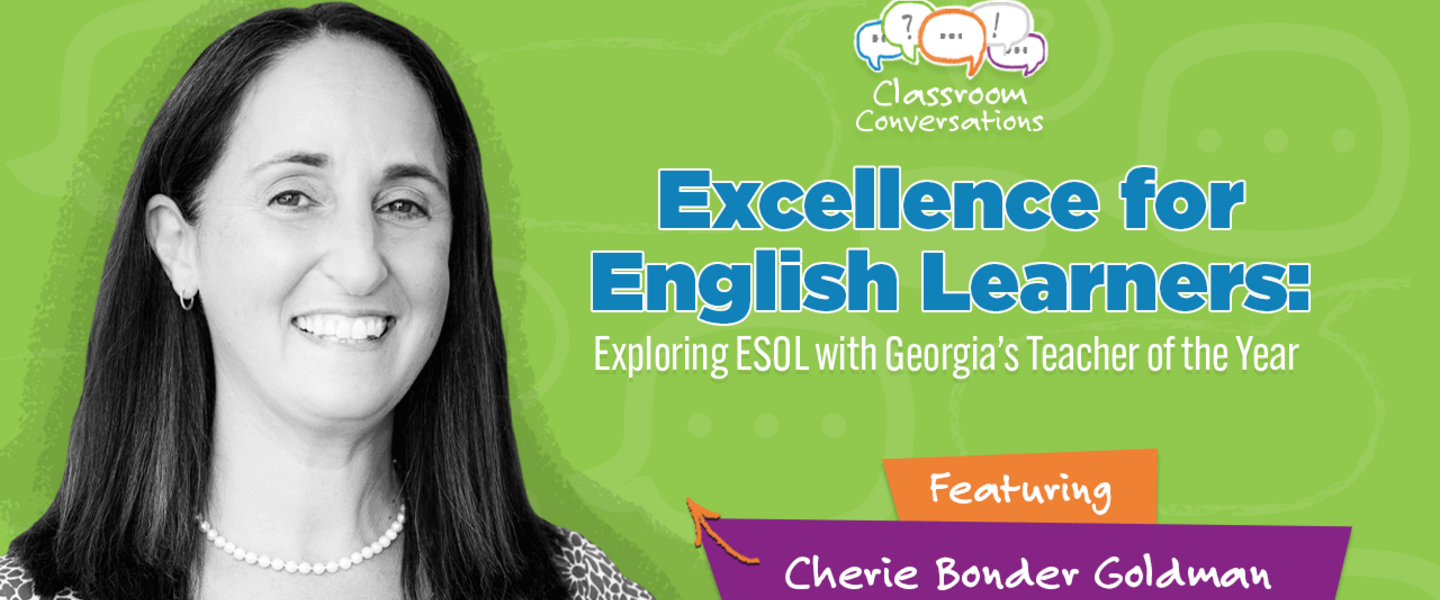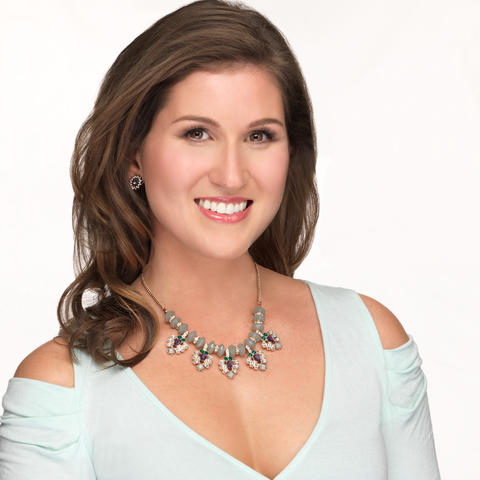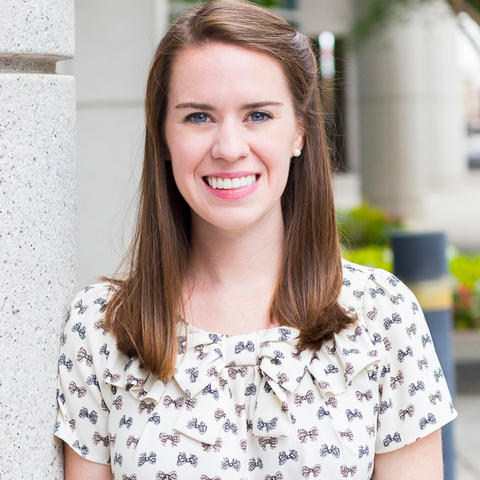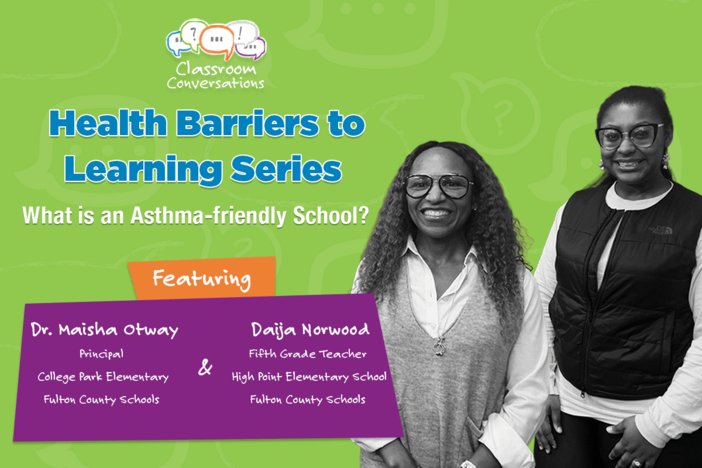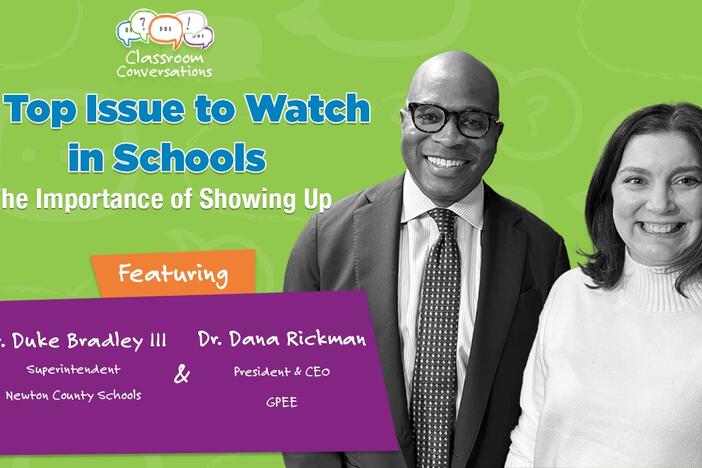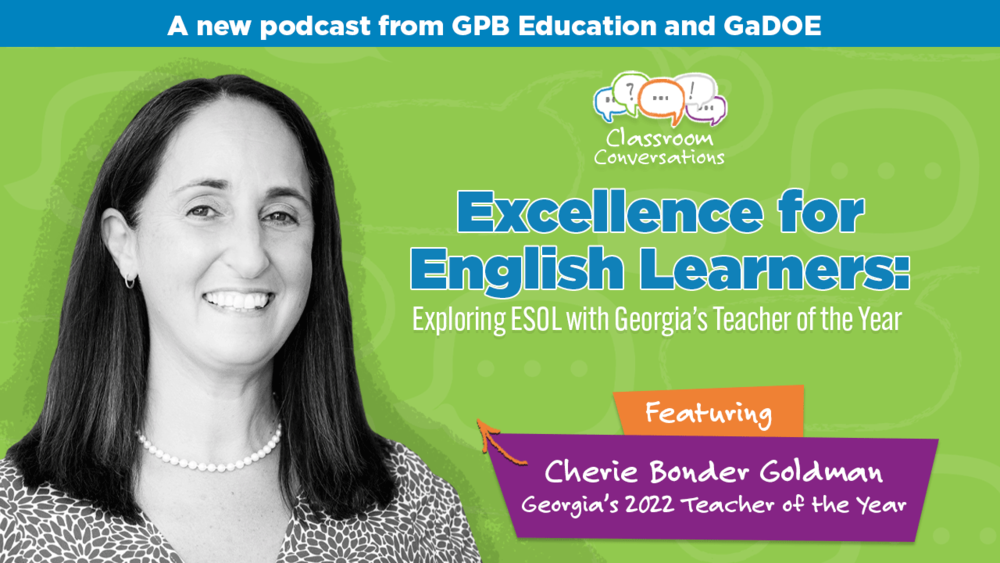
Section Branding
Header Content
Episode 110: Excellence For English Learners: Exploring ESOL With Georgia’s Teacher Of The Year
Primary Content
Georgia's 2022 Teacher of the Year, Cherie Bonder Goldman, joins us to talk about her experience as TOTY and share some instructional strategies she's gained as an ESOL teacher at Hesse K-8 School in Savannah-Chatham County Public School System. Check out this episode and more of Classroom Conversations wherever you listen to podcasts (Spotify, Apple, Google, etc)!

Click here for the discussion guide!
Georgia's 2022 Teacher of the Year, Cherie Bonder Goldman, joins us to talk about her experience as TOTY and share some instructional strategies she's gained as an ESOL teacher at Hesse K-8 School in Savannah-Chatham County Public School System.
TRANSCRIPT
Ashley Mengwasser: Hello there. Welcome back to Classroom Conversations, the platform for Georgia's teachers. This podcast series presents teacher guests to a teacher audience for the benefit of enriching your instructional strategies. Classroom Conversations is produced by Georgia Public Broadcasting here at GPB's talk studio in Atlanta, and it's brought to you by the Georgia Department of Education. I'm your host, Ashley Mengwasser, great to be here. Let me preview today's teacher feature. You guys, I am seriously fangirling right now. She's here, the chosen one, the pride of Georgia educators, the celeb of classroom celebs, flexing for Georgia Public Education, Georgia's 2022 Teacher of the Year, Cherie Goldman.
Cherie is an English as a second language, or ESOL teacher at Hesse K-8 School in Savannah-Chatham County Public Schools. And she's here to talk about her ESOL experiences today. In addition to being Georgia's top teacher, Cherie is a degree holder from all four of these little known institutions, Georgetown, Stanford, Armstrong Atlantic State and Mercer. Have you heard of them? There are about 140,000 ESOL students in Georgia, and as Cherie says, "It's really important to make sure we can meet their needs." Once you hear her story, you're going to be proud to have her represent Georgia across the state and the nation. Welcome to the podcast, Cherie Goldman.
Cherie Bonder Goldman: Thank you so much for having me. I really appreciate it.
Ashley Mengwasser: How did you feel about that intro? I saw your face turning a little red earlier.
Cherie Bonder Goldman: Yeah, that was a bit much, but thank you.
Ashley Mengwasser: Never enough, in my opinion. We're so excited to have you here. It feels like a celebrity guest, for sure.
Cherie Bonder Goldman: Thank you very much. I appreciate it.
Ashley Mengwasser: And you came all the way from Savannah?
Cherie Bonder Goldman: Yes. I drove all the way up here from Savannah. It's great to be up here in Atlanta visiting with everyone, and just to be able to be here to speak with you today.
Ashley Mengwasser: We're so excited. Great to have you in The A Cherie. I got to just start at how you found out this great news. Where were you when you found out that you were named Teacher of the Year?
Cherie Bonder Goldman: Well, so normally, they have a gala for announcing Teacher of the Year, and they were not able to have that because of COVID. So they weren't able to bring all the district Teachers of the Year together in order to make that announcement and have that celebration.
So what they did was they did it virtually, and we had a celebration with various professional development sessions and speakers. And then at the end of the evening of the second day, they did an announcement over Zoom.
Ashley Mengwasser: So you were on Zoom?
Cherie Bonder Goldman: Yes, I was on Zoom, and I was sitting in my dining room with my dad, and my son, and my dad's girlfriend. And we were just all sitting there watching it on the computer. So it was definitely different than a gala, but nonetheless, it was special to be able to be with them.
Ashley Mengwasser: And tell us who was lurking outside.
Cherie Bonder Goldman: So lurking outside, unbeknownst to me, was our school Superintendent, Dr. Ann Levett, along with Stacy Jennings, who is the Director of Communications for Savannah-Chatham County Public Schools, and Matt Jones, who is the Chief of Staff at the Georgia Department of Education. They were hiding out in my yard for quite a while, while the whole ceremony was going on. So it was wild.
Ashley Mengwasser: Behind your bushes. And then your dog ... was it your dog who tipped you off?
Cherie Bonder Goldman: Yes, my dogs tipped me off. Well, but even then I didn't put it together. We were watching the events of the evening and the ceremony. And literally, right when they were about to announce who the Georgia Teacher of the Year was, my dogs who had been perfectly silent the whole night, decided to start to go crazy. And I was like, I can't believe they're doing this right now, right when they're about to say it.
Ashley Mengwasser: In the middle of the big moment.
Cherie Bonder Goldman: In the middle of it. And it turned out, it was because they saw Dr. Levett, and Mr. Jones, and Ms. Jennings start to come across my yard, unbeknownst to me, and I didn't even notice it. So yes, they were the welcome committee, my dogs.
Ashley Mengwasser: And they were just there to congratulate you, which is so special. And your fiance did something special that day. Tell us that story.
Cherie Bonder Goldman: Yes, he did. So he was too nervous to stay for the whole thing.
Ashley Mengwasser: Love that.
Cherie Bonder Goldman: Yes. Anyone who knows him, he knows he's a ball of energy and he was a nervous wreck. So he decided to go to the Savannah Bananas game that evening. The Savannah Bananas is a baseball team in Savannah. It's not minor league, but it's a college league team where college players from different schools come together and get to play in a league when they're in their off season. So he went to the Savannah Bananas game and he was watching it on his phone the entire time during the game. And he came racing home, and he grabbed me right after Dr. Levett and Matt and Stacy left. And we raced to the ballpark, and he had them take me out onto the field on the mound and announced that I was named Georgia Teacher of the Year, and about, I don't know, maybe several thousand people started screaming. So it was wild.
Ashley Mengwasser: Oh my gosh! People with banana foam fingers and things like that?
Cherie Bonder Goldman: Yes. The Savannians went banana. Yes. It was pretty cool.
Ashley Mengwasser: Could you have had a better, more exciting crew? I don't think so. I think it's pretty cool. That's pretty much the pinnacle. Well, into your career as a teacher, when and why did you start teaching here in Georgia?
Cherie Bonder Goldman: So I started teaching in Georgia in 2010 after I got my degree at Armstrong Atlantic State. When I was in college, I had studied Japanese and I wanted to become a language teacher, this was as an undergraduate. Continued my studies in graduate school, and then when I tried to find a job in teaching for Japanese, that didn't quite come together, because those are pretty scarce positions. So I pivoted and I ended up having this career in advertising for several years. And when my son was in kindergarten, I wasn't working at the time, but I wanted to go back to work and I was like, wait a minute, I wanted to be a teacher. And so it was my moment to get back in. And we had moved to Savannah to be near my family at the time and so I just went back and hopped right in.
Ashley Mengwasser: You sure did. But you had an advertising career on the West Coast.
Cherie Bonder Goldman: Yes. So my advertising career, so I started in, so like I said, I couldn't find a job in Japanese in teaching. And so I was like, what am I going to do with this degree? And so I ended up exploring different industries. What do I want to do with this? And on the West Coast, there are a lot of Japanese corporations and their advertising agencies are close by and I thought, well, why don't I try advertising? And I ended up landing at a agency called Saatchi & Saatchi, which handles the Toyota account, the national Toyota advertising campaign. And also the account director there is the worldwide account director because the agency handles the Toyota advertising in about 25 different countries. So that was my entree with a Japanese company at an ad agency, and then it just became a career in advertising.
Ashley Mengwasser: And eventually, like you said, circled back to your calling, which you feel is teaching. What do you love about teaching?
Cherie Bonder Goldman: Well, what I love about teaching, I mean, quite simply, it's just all about making a difference and just really helping my students just come into their own and realize their potential as individuals. I enjoy giving them that safe space where they can become independent thinkers, creative thinkers, and also just contributive members to society. I like being able to make that simultaneous impact in the larger sense, because really, I mean an educated society is a thoughtful and collaborative and a more communicative society. And so I love how teaching has that individual impact, but also that larger impact.
Ashley Mengwasser: And you were able to parlay your love of languages into your career. I'm sure that led you to the ESOL arena. So let's start our exploration. By holding maybe some common approaches to ESOL education up to the light, and we'll take a closer examination here. We do know that the research supports an asset-based approach instead of a deficit based approach. With that in mind Cherie, what are some common approaches to teaching English learners that you'd like to just go ahead and bust today?
Cherie Bonder Goldman: Right. Yes. It is incredibly important to have that asset based mindset where we are really taking advantage of what our students are bringing to the table, as opposed to having a deficit mindset where we're thinking about what our students are lacking or what their shortcomings might be. And that's really the case with all of our students, but it's definitely something that we need to think about when it comes to ESOL students.
So just some of the things that I really want people to think about when they're working with ESOL students, I guess is, first of all, that every ESOL student isn't an immigrant or doesn't necessarily come from the same background or cultural background or socioeconomic status. We can't group our ESOL students collectively, it's not a catchall. And we need to demonstrate that we have an appreciation for their individuality. And on the surface, this is just so obvious, but in reality, ESOL students aren't really treated that way especially in a school where you'll have a large number of ESOL students who speak the same language. Like if you have a lot of students who speak Spanish in your school, some people might assume, well, because they all speak Spanish, they're all the same, but they're not. Some might come from Mexico and some come from El Salvador. And the culture of those countries are very different.
And then also just because not only do they have these very different backgrounds, but they have very different command of English and also a different command of their primary language. So an immigrant student from El Salvador might not know any English while the student whose family is originally from Mexico they might have a command of English in terms of interpersonal language, but just not academic language. Or even a student who's born in the United States, but has their family is from another country, they might not even be fluent in their primary language. And so there are so many things that we need to look at as teachers to appreciate their individuality and not group them together collectively so that we can differentiate and build those meaningful relationships.
Ashley Mengwasser: Yeah. You told me this before, which I thought was really interesting that you're separating language proficiency with their intelligence. You can't use that as an indicator.
Cherie Bonder Goldman: Yes, absolutely. Again, on the surface, it's something that we know that's really obvious that someone's language proficiency is not a measure of their intelligence. So if I move to China and I don't speak a word of Chinese, it's not a measure of my intelligence, right? So it's just merely a measure of my proficiencies. But unfortunately again, sometimes our ESOL students are treated that way and it is true that some of our ESOL students come to us without even had any schooling, maybe in their native country, if they're coming to us as immigrants. But even those students do come to us with perspectives and experiences and knowledge that we can build on. And it's really important for us to build on that with our students and take advantage. Again, it's from that asset perspective, what can they do? And when their teachers believe in what they can do, then those students can really have confidence and engage in the classroom.
Ashley Mengwasser: Wonderful. And how do teachers build relationships and build bridges with these students as individuals? What do you recommend?
Cherie Bonder Goldman: Well, I think obviously the foundation for working with our ESOL students is building those relationships. And because we want them to have confidence in who they are when they are stepping into an environment that might be unfamiliar to them, or it might be intimidating for them. And teachers need to really approach our ESOL students in a non-judgmental way, and our personal perspectives on culture impact our ability to serve those ESOL students effectively. So building the relationships is really important for our students. They want to feel welcome, they want to feel accepted. And it's not just about building the relationships with the students. It's about building relationships with their families as well, so that we can help families help their students be successful. And really, as an ESOL student, those relationships are so important. You're an advocate is really what you are in so many ways.
Ashley Mengwasser: Yes. And you mentioned parents, huge linchpin, a key part of their success. How do you build EL parents capacity to actively engage in their children's education?
Cherie Bonder Goldman: Right. It's really about open lines of communication, and that's not something that should just be done by ESOL teachers, it's something that can be done by classroom teachers as well. It's important for classroom teachers to do it. Because ESOL teachers, we don't have these students in our classroom the majority of the time. At least at my school, we pull them out during resource time. And so the majority of the time the students are with their classroom teachers. So it's important for classroom teachers to be building these relationships with parents as well. And we learned a lot of about that during the pandemic.
Looking again at my school specifically, we have over 200 ESOL students at our school that makes up about 20% of our ESOL population. And especially at the beginning when not all of our students were connected with devices and Wi-Fi and their parents struggled with being able to help them with that it was really important for us to do that. So again, it was taking advantage of that technology. And you don't need to know how to speak the language of your pair of those students or the parents sometimes, it's really about making that effort. The families are just so appreciative to have people who reach out. So using Google Translate or using SayHi to translate things very simply for families, that's just the beginning.
And a lot of the parents it's really about reaching out because sometimes they don't understand the communication protocols or they might be from a culture where that parent teacher relationship is very different. So we need to just show that effort and they're just so appreciative because they just want to help their students just as much.
Ashley Mengwasser: And model that you want them involved, right?
Cherie Bonder Goldman: Exactly. It's about modeling that we want them involved.
Ashley Mengwasser: You want them involved. And you talked about welcoming them into the building as well in addition to that communication that you talked about that maybe there might be family engagement events that they could be invited to. Tell me about that.
Cherie Bonder Goldman: Yeah. So family engagement is a really important part of what we do, really trying to make the parents not just go out to them through communication, like you said, but it's bringing them in. It's about making sure that they feel like they are part of the community. So we try to hold community engagements events at least quarterly at our school in order to make them feel involved. So for example, at the beginning of the year, we'll have a specific ESOL open house, or then during the year we'll have meetings for our ESOL families that have both academic and practical components to them.
Cherie Bonder Goldman: So one night it might be, we talk to them about what the ESOL program is, and then we'll talk to them about how they could support reading at home. Or another night we'll show them how to register their kids for pre-K and kindergarten, because they're struggling with using the portal. And then we'll have, there was an issue we had in our neighborhood where several of our families were having fires in their homes. And so we had people from the fire department come and talk about how they could get free smoke detectors. So yeah, that was a really great program. So it's a matter of connecting them in so many ways and making them really feel like they're part of the community.
Ashley Mengwasser: Well you mentioned this earlier, you alluded to it, that students are entering your classrooms with funds of knowledge. I want to define this a little bit. That is knowledge, perspectives, even skills that may derive from their communities, their cultural practices, which you spoke about their home life, even their primary language being a fund of knowledge, right? So how do you capitalize on students' innate funds of knowledge in the classroom and use that?
Cherie Bonder Goldman: Right. Yeah. We always talk about our students' background knowledge and lots of times we think about that. Oftentimes what we mean is their academic background, but really to your point, it does have to do with what are they bringing to the table to the classroom personally from their culture, from their experiences, from their language. And there are simple ways in which you can tap into students' funds of knowledge. And then there are also just some more expansive ways.
Cherie Bonder Goldman: So simple ways would just be, it's just having the regular conversations with your students. These can be the Monday morning conversation about how was your weekend. It can also be about making text to self connections when you're reading a book so that the student can bring themselves into the reading experience when you're reading a book together in the class. Some more expansive ways examples would be during Hispanic Heritage Month, you're reading stories about Hispanic heroes or you're allowing students to write about their home countries and their cultures, and you're building their academic skill, but also tapping into their own personal knowledge and acknowledging the importance of who they are and where they come from.
Ashley Mengwasser: Bringing that to bear in the classroom, which is inviting them in much like you want to do with parents.
Cherie Bonder Goldman: Exactly.
Ashley Mengwasser: In 12 years of teaching, Cherie, I'm sure you have so many, but we'd love to hear an ESOL success story or two where you've just seen really great progress with one of your English learners.
Cherie Bonder Goldman: Well, I have to be honest, I don't necessarily have a story about a single child. I feel like I've had success with my ESOL students because it's an approach that I take with them. And again, it goes back to building that relationship. And when my students walk into the room, I let them know that they're in a safe space. I completely embrace them for who they are and where they are, and whether that's personally or academically. And I don't want to make them feel like they have to be anybody but themselves. So when students are acquiring another language, one of the first stages can be a quiet period when they won't speak at all.
Ashley Mengwasser: Wow.
Cherie Bonder Goldman: Yeah, it's quite remarkable, but it's not something that teachers should be daunted by. It is part of the natural process of language acquisition.
Ashley Mengwasser: What do you do?
Cherie Bonder Goldman: It's about patience and embracing that child exactly where they are and building the relationship so that they feel like they're in a safe space. I step back and just give them their space to show what they know in their own time. And I build a trusting relationship, and then all of a sudden it's like one day like, bam! It just comes pouring out of them or they start ... Yeah. They start speaking or they start writing or they start reading and you're just like, wow!
Ashley Mengwasser: Fire ignited.
Cherie Bonder Goldman: The fire ignited. They just finally settled into it. And it's just about the relationships that I create with them is I think really that I just, I really enjoy that. And I feel like those are my stories.
Ashley Mengwasser: You're describing that you're not pushing them out of their comfort zone, you're embracing them where they are. And you're letting them step up to the table. To go back to your China example, I've been to China twice and worked on a documentary. And that was us, we didn't speak a lick of Mandarin or Cantonese wherever we were. So when anybody is on unfamiliar territory, you have to wait till somebody acclimates a little bit.
Cherie Bonder Goldman: Right. Exactly. And it's not that I don't have any expectations for them, or I lower the bar for them. But at the same, I give them that space to just get into the comfort zone. And that's when they'll step up.
Ashley Mengwasser: Very good point. How are you navigating changes that the pandemic brought?
Cherie Bonder Goldman: Right. I think different teachers are seeing different things depending on how their school or their district approached everything. Everyone was virtual from March until May of 2020. But the big difference is what happened from 2020 to '21, right? So some schools went back in person, some schools were all virtual, some schools did a hybrid. And then you've got the differing degrees to which parents were able to support their students, whether it was because of things like language barriers with our ESOL students or because parents had to go back to work and things like that. And that impacted the degree to which students were, or weren't behind, despite the efforts of our teachers and everything.
So I'm in a K-8 school, and I think that we have seen the effects of the pandemic across all of the grade levels. In the most general sense I think the greatest impact kind of academically and socially has been in what I call those transitional grades. So in the first graders who never came to school for kindergarten, or the seventh graders who never experienced that first year of middle school. Because kindergarten and sixth grade are kind of like, you're not just learning that new content, you're learning a new way of life. And so I think that's been challenging and I think across all grade levels, students have struggled socially compared to our students in prior years. And really, I think what teachers have done, what they're doing to navigate this is quite simply to just meet the students where they are. There was so much pressure at the beginning of, we've got to fill the gaps, we've got to catch them up and everything.
And I think that teachers were very overwhelmed by that, but the copy room conversations that I'm having now is that teachers have almost embraced the gaps is too strong, but I think that what they're saying is they saw those lags at the beginning of the year and it was overwhelming for them, but most of the conversations now are about the progress.
It's about, "Okay, look, I know that my first graders aren't necessarily where my first graders traditionally are, but goodness, they have made progress and they are loving being here and they are working hard and we are having success." And it's so nice to hear that turn in the voices of teachers. I mean, I think teachers are tired and teachers have been working hard. But I think that those are the rewards that are coming out of it for teachers.
Ashley Mengwasser: So your observational powers are still on flake, Cherie. You're not Teacher of the Year for no reason, but how are you assessing student progress then given all this across the different modes of communication throughout the school year?
Cherie Bonder Goldman: Right. So as you mentioned, we do give an assessment to all English, if you're talking about the assessment of students like ESOL students, we do give the ACCESS test of English proficiency to all students in the state of Georgia once a year and that assesses them on their reading, writing, listening, and speaking. So that's our primary baseline for all of our ESOL students. But just other things that we do, we really work with our homeroom teachers to call data from them, their various district benchmarks. In my district, we use MAP testing. In my school, we'll use writing scrimmages to see how students are doing with they're writing. It's just curriculum tools that teachers are using. We are able to glean quantitative information about our students from that and let that inform our instruction.
Cherie Bonder Goldman: But also, and it just gives us insight into knowledge. Another tool that we use as ESOL teachers, the organization that writes the ACCESS test for English proficiency, which is called WIDA, they also provide us with rubrics that we can use for analyzing speaking, and writing tasks. And that helps us assess. As a ESOL elementary teacher I don't give grades, but qualitative observation is a huge part of what I do. And as I cycle through materials when I'm teaching students, I'm always making sure to scaffold and reuse and scaffold and reuse so that I can see if they've absorbed what I've taught, and then they're able to continually reapply it. And I notice whether or not I've got to reteach or whether we can move on.
Ashley Mengwasser: I got you. So you have quantitative and qualitative measures you can use that keep your finger on the pulse of progress?
Cherie Bonder Goldman: Right.
Ashley Mengwasser: Okay, great. Are there any techniques or exercises that you use with your EL students that you'd like to share with our audience of educators? We want to know all your tricks, Cherie. I think they're not all proprietary.
Cherie Bonder Goldman: No, they're not proprietary. Yes, no, when I find good tricks, I pirate so I'm not shy. So I think that there are a variety of techniques that I really like to use. I think the basis for all of them is differentiation because that's really the key to supporting ESOL students and recognizing their unique background and realizing that they learn differently. But I think the other thing that I really keep in mind in all of the techniques that I use is whether I'm working on basic interpersonal skills, which is what we call BICS. So that's basically the social language and whether we're talking about their cognitive academic language, so that's the academic language for things that are cognitively more demanding. So when I pick out my techniques, I'm thinking about differentiation, and I'm thinking about, is this interpersonal skill, or is this academic language? So I think one of my favorite techniques is what we call picture word induction model.
Ashley Mengwasser: I'm already intrigued.
Cherie Bonder Goldman: I'm sorry. I'm hoping I'm not getting too technical, but to dive specifically, so picture word induction model is a vocabulary strategy that we can use. And it's amazing how far you can take one picture based on your students' skill. And it's also what I like about it, is it's a very low prep strategy. So you can use one picture to engage all four domains of language development. So whether it's reading, writing, listening, or speaking, you can share a picture that provokes thought and develop vocabulary, and come up with a vocabulary list and have students chorally read those words together.
You can have them write sentences about it. You can ask them questions about it, or they can make up questions about it. You can also have them brainstorm titles for the pictures. So that's one strategy that I really like to use, something visual that they can relate to. Another is a writing strategy. I like to use sentence frames and sentence starters. And lots of times people think of those as something for really young grades, kind of like that fill in the blank, finish the sentence, right?
Ashley Mengwasser: I know. You got your first few words, but you have to finish the rest.
Cherie Bonder Goldman: Exactly. But really, language has so many patterns to it sometimes that we don't even realize and especially academic language. So if you're talking about comparing and contrasting something, we have patterns, A and B are similar because, or A is different from B. So lots of times when we're teaching various academic skills, we can find those sentence frames and structures, and we can use those with our ESOL students to help them build their language skills and build syntactic features that they may not have already, and that can be used with academic language.
Cherie Bonder Goldman: And then another one that I like to use is I also like to use thematic units, because they are a great opportunity, again, to tap into the four different domains, but then also be cross curricular with it. So if I'm teaching about pollution, I can pull in science and reading and math and writing all at once. And I can explore it in a very broad way. I can differentiate it for the different students in my room. If they're writing, they can write on different levels. If their vocabulary is on different levels, we can dig to the level to which they're comfortable. So those are three strategies that I really like to use with my students.
Ashley Mengwasser: Tip of the iceberg. You are such an innovator, Cherie, you make us so proud.
Cherie Bonder Goldman: I don't know if I'm an innovator, but I've had some great support along the way. So I've appreciated all the training that I've gotten from people.
Ashley Mengwasser: Excellent. Well, thank you for being with us today. Could you just leave an autograph please for the annals of this show. We're going to have to get all of our teachers of the year for coming years on the show, but you'll always be our first, Cherie. Is there anything else you want anybody to know about teaching ESOL in our schools?
Cherie Bonder Goldman: I would just, again, I mean, I've already said it, but build the relationships with these students and build relationships with your ESOL families. And that's where it all starts. That's where ESOL starts.
Ashley Mengwasser: Okay. Thank you, Cherie. To all of our educators listening, ESOL and all, remember this, you're a great teacher. Bye, bye.
We hope you've enjoyed season one of Classroom Conversations. We have plans to keep the momentum going with season two. So if you have a classroom conversation you'd like to hear, we want to know about it. Email us at education@gpb.org.
